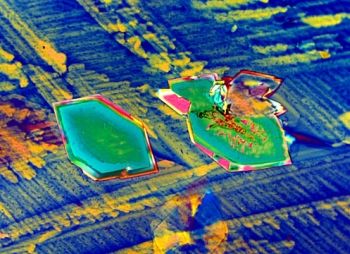
Publisher:
Bonnie King
CONTACT:
Newsroom@Salem-news.com
Advertising:
Adsales@Salem-news.com

~Truth~
~Justice~
~Peace~
TJP
Aug-23-2010 12:25

 TweetFollow @OregonNews
TweetFollow @OregonNews
EPA to End All Use of Bird-Killing Pesticide
Salem-News.comAldicarb Production to Cease in 2014; New Restrictions Implemented.
 This very toxic insecticide is the sulfone metabolite of the carbamate aldicarb (Temik). Aldicarb is drilled into the soil, a process known as "Spiked", at planting or during various stages of plant growth. Courtesy: microscopy.fsu.edu |
(WASHINGTON D.C.) - American Bird Conservancy (ABC), the nation’s leading bird conservation organization, and other environmental groups today welcomed the decision by the Environmental Protection Agency and Bayer CropScience to cease production of the pesticide aldicarb in 2014, begin phasing out its more dangerous uses immediately, and end all uses by 2018.
American Bird Conservancy had voiced grave concerns to EPA over the use of aldicarb as far back as 2005. Following official ABC comments, as well as comments from other groups, applications of aldicarb were restricted in both the amount of the pesticide that could be used per application and the number of times it could be applied per year. Many of the concerns about aldicarb came from groups who are members of the National Pesticide Reform Coalition (NPRC). NPRC was formed in 2002 by ABC and other non-profit groups who recognized an increasing need for coordination in addressing issues arising from the Environmental Protection Agency’s pesticide registration and re-registration processes.
“While that earlier decision regarding restrictions for aldicarb was certainly a step in the right direction, we felt at the time that an outright ban was called for. Today’s decision to implement a phased cancellation, will better safeguard birds and other wildlife as well as drinking water and the health of people in rural America,” said Dr. Michael Fry, Director of Conservation Advocacy for ABC.
Aldicarb, marketed under the trade name Temik® and produced by Bayer CropScience, is one of the most toxic insecticides on the market. Applied to the ground as tiny granules, aldicarb can be mistaken by birds for grain or grit. It is so toxic that a single granule is lethal if eaten by a songbird. Since 1986, the Avian Incident Monitoring System has documented numerous bird kills from aldicarb, including Bald Eagles and Golden Eagles.
Under federal regulations, each registered pesticide must undergo a technical review every 15 years to be eligible for continued registration. With this EPA decision, the highest risk uses will be terminated first, and lower aldicarb application rates will be implemented for continuing uses.
To address the most significant risks to human health, Bayer has agreed first to end aldicarb use on citrus and potatoes, and will adopt risk-mitigation measures for other uses to protect groundwater resources. New measures to protect shallow drinking water wells in vulnerable areas of the southeastern U.S. coastal plain and lower application rates will be immediately added to product labels for use on cotton, soybeans, and peanuts.
Bayer will voluntarily phase out production of aldicarb by December 31, 2014. All remaining aldicarb uses will end no later than August 2018. Additionally, EPA plans to revoke the tolerances (pesticide residues allowed on food) associated with these commodities.
Based upon current toxicological studies, aldicarb at levels higher than those typically found in food has the potential to cause various human health effects such as sweating, nausea, dizziness and blurred vision, abdominal pain, vomiting, and diarrhea.
During the phase-out, the pesticide will continue to be registered for use on cotton, dry beans, peanuts, soybeans, sugar beets, and sweet potatoes. Aldicarb products are not intended for sale to homeowners or for use in residential settings. A restricted use pesticide, aldicarb may currently be applied only by trained, certified pesticide applicator.
American Bird Conservancy (abcbirds.org) conserves native birds and their habitats throughout the Americas by safeguarding the rarest species, conserving and restoring habitats, and reducing threats while building capacity of the bird conservation movement. ABC is a 501(c)(3) not-for-profit membership organization that is consistently awarded a top, four-star rating by the independent group, Charity Navigator.
Articles for August 22, 2010 | Articles for August 23, 2010 | Articles for August 24, 2010
Quick Links
DINING
Willamette UniversityGoudy Commons Cafe
Dine on the Queen
Willamette Queen Sternwheeler
MUST SEE SALEM
Oregon Capitol ToursCapitol History Gateway
Willamette River Ride
Willamette Queen Sternwheeler
Historic Home Tours:
Deepwood Museum
The Bush House
Gaiety Hollow Garden
AUCTIONS - APPRAISALS
Auction Masters & AppraisalsCONSTRUCTION SERVICES
Roofing and ContractingSheridan, Ore.
ONLINE SHOPPING
Special Occasion DressesAdvertise with Salem-News
Contact:AdSales@Salem-News.com



Salem-News.com:
googlec507860f6901db00.html
Terms of Service | Privacy Policy
All comments and messages are approved by people and self promotional links or unacceptable comments are denied.
gp August 23, 2010 2:03 pm (Pacific time)
Why is it being used til 2018? This is a crock of you know what.
Roger von Bütow August 23, 2010 12:54 pm (Pacific time)
Tim:
ALDICARB was one of the synthetics I mentioned in my recent Irvine Great Park column:
Carbamates:
Carbofuran, aldicarb, carbaryl
Effect the central nervous system of birds and mammals
Good-bye and good riddance!
Aug-19-2010: Irvine Great Park Inherits Contaminants - Roger Butow Salem-News.com's 'Odd Man Out'
[Return to Top]©2026 Salem-News.com. All opinions expressed in this article are those of the author and do not necessarily reflect those of Salem-News.com.